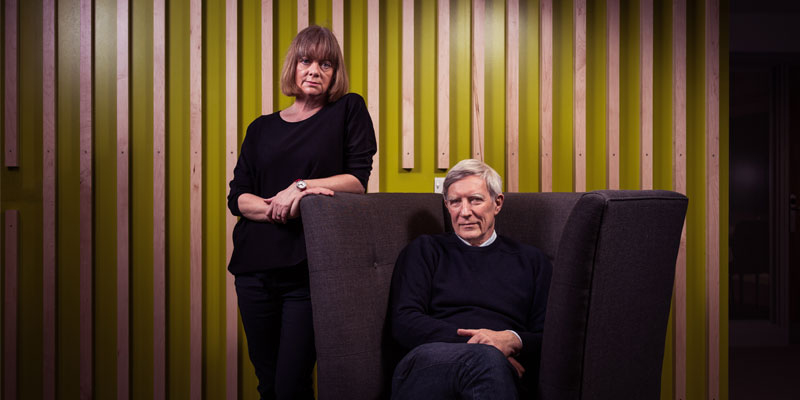|
Exposing the impact of social inequality
Why are rich, developed countries still affected by a range of health and social problems?
The issue
Health inequalities are significant and persistent; the health and happiness of populations in rich, developed nations are no longer linked to economic growth. But how do the social and economic structures of society shape wellbeing? Kate Pickett, Professor of Epidemiology in the Department of Health Sciences, and Richard Wilkinson, a Visiting Professor at the University of York, investigated this question.
The research
Professor Pickett and Professor Wilkinson's research, synthesised in The Spirit Level (Penguin, 2009) and The Inner Level (Penguin, 2018), shows that income inequality - the gap between rich and poor - strongly influences people's health and wellbeing as well as human capital formation and social cohesion.
Their research found that inequality causes a wide range of health and social problems, from reduced life expectancy and higher infant mortality to poor educational attainment, lower social mobility and increased levels of violence and mental illness.
Differences between more and less equal societies are large, and everyone is affected by them. Inequality affects our intimate, personal lives; it psychologically divides us from the status, support and solidarity that keep us well.
Professor Pickett and Professor Wilkinson argue that inequality is a major roadblock to creating sustainable economies that serve to optimise the health and wellbeing of both people and the planet. Because consumerism is about self-enhancement and status competition, it is intensified by inequality. Inequality leads to a societal breakdown in trust, solidarity and social cohesion, it reduces people's willingness to act for the common good.
The outcome
Professor Pickett and Professsor Wilkinson's work has shifted public debate across the world – at local, national and international level – and shaped political thinking, legislation and policy making. Examples include:
- many local Fairness Commissions
- the UK 2010 Equality Act
- the UN-sponsored New Development Paradigm
- the scientific review of the 17 United Nations Sustainable Development Goals (SDGs).
The researchers co-founded The Equality Trust, an educational and campaigning charity, to raise awareness of the impact of inequality and generate activism to promote greater equality in the UK and worldwide.
The issue
Health inequalities are significant and persistent; the health and happiness of populations in rich, developed nations are no longer linked to economic growth. But how do the social and economic structures of society shape wellbeing? Kate Pickett, Professor of Epidemiology in the Department of Health Sciences, and Richard Wilkinson, a Visiting Professor at the University of York, investigated this question.
The research
Professor Pickett and Professor Wilkinson's research, synthesised in The Spirit Level (Penguin, 2009) and The Inner Level (Penguin, 2018), shows that income inequality - the gap between rich and poor - strongly influences people's health and wellbeing as well as human capital formation and social cohesion.
Their research found that inequality causes a wide range of health and social problems, from reduced life expectancy and higher infant mortality to poor educational attainment, lower social mobility and increased levels of violence and mental illness.
Differences between more and less equal societies are large, and everyone is affected by them. Inequality affects our intimate, personal lives; it psychologically divides us from the status, support and solidarity that keep us well.
Professor Pickett and Professor Wilkinson argue that inequality is a major roadblock to creating sustainable economies that serve to optimise the health and wellbeing of both people and the planet. Because consumerism is about self-enhancement and status competition, it is intensified by inequality. Inequality leads to a societal breakdown in trust, solidarity and social cohesion, it reduces people's willingness to act for the common good.
The outcome
Professor Pickett and Professsor Wilkinson's work has shifted public debate across the world – at local, national and international level – and shaped political thinking, legislation and policy making. Examples include:
- many local Fairness Commissions
- the UK 2010 Equality Act
- the UN-sponsored New Development Paradigm
- the scientific review of the 17 United Nations Sustainable Development Goals (SDGs).
The researchers co-founded The Equality Trust, an educational and campaigning charity, to raise awareness of the impact of inequality and generate activism to promote greater equality in the UK and worldwide.
Additional information
Exposing the impact of social inequality
Why are rich, developed countries still affected by a range of health and social problems?

The issue
Health inequalities are significant and persistent; the health and happiness of populations in rich, developed nations are no longer linked to economic growth. But how do the social and economic structures of society shape wellbeing? Kate Pickett, Professor of Epidemiology in the Department of Health Sciences, and Richard Wilkinson, a Visiting Professor at the University of York, investigated this question.
The research
Professor Pickett and Professor Wilkinson's research, synthesised in The Spirit Level (Penguin, 2009) and The Inner Level (Penguin, 2018), shows that income inequality - the gap between rich and poor - strongly influences people's health and wellbeing as well as human capital formation and social cohesion.
Their research found that inequality causes a wide range of health and social problems, from reduced life expectancy and higher infant mortality to poor educational attainment, lower social mobility and increased levels of violence and mental illness.
Differences between more and less equal societies are large, and everyone is affected by them. Inequality affects our intimate, personal lives; it psychologically divides us from the status, support and solidarity that keep us well.
Professor Pickett and Professor Wilkinson argue that inequality is a major roadblock to creating sustainable economies that serve to optimise the health and wellbeing of both people and the planet. Because consumerism is about self-enhancement and status competition, it is intensified by inequality. Inequality leads to a societal breakdown in trust, solidarity and social cohesion, it reduces people's willingness to act for the common good.
The outcome
Professor Pickett and Professsor Wilkinson's work has shifted public debate across the world – at local, national and international level – and shaped political thinking, legislation and policy making. Examples include:
- many local Fairness Commissions
- the UK 2010 Equality Act
- the UN-sponsored New Development Paradigm
- the scientific review of the 17 United Nations Sustainable Development Goals (SDGs).
The researchers co-founded The Equality Trust, an educational and campaigning charity, to raise awareness of the impact of inequality and generate activism to promote greater equality in the UK and worldwide.
Additional information
- The Spirit Level
- The Inner Level
|
FEATURED RESEARCHER

Kate Pickett
Professor Pickett is a Fellow of the RSA and the UK Faculty of Public Health. Her research focuses on the social determinants of health and health inequalities, with a particular interest in child development. She is a global Ambassador for the Wellbeing Economy Alliance.



No comments:
Post a Comment